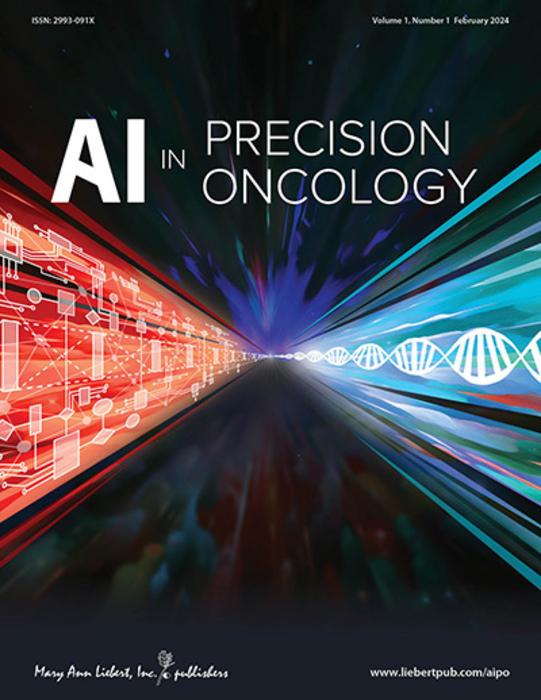Two new Review articles in the peer-reviewed journal AI in Precision Oncology explore the role of artificial intelligence (AI) in early cancer detection. A primer provides an overview of AI and the second Review examines the promising clinical applications of AI in early cancer detection.

Credit: Mary Ann Liebert, Inc.
Two new Review articles in the peer-reviewed journal AI in Precision Oncology explore the role of artificial intelligence (AI) in early cancer detection. A primer provides an overview of AI and the second Review examines the promising clinical applications of AI in early cancer detection.
In the primer, Nikhil Thaker, MD, Medical Director and Chair of Radiation Oncology, Capital Health, and Co-Founder, Chief Medical Officer at Bayta Systems, and coauthors, describe the relevance, methodologies, and applications of AI. AI applications span various oncology data types, including electronic health records, medical imaging (radiology and digital pathology), biomarkers (genomics, proteomics, metabolomics), and digital health sensors. Leveraging AI in oncology enhances diagnostic accuracy, improves treatment selection, and enables early detection through innovative approaches like wearable devices and mobile health applications.
In the Review titled “The role of Artificial Intelligence in Early Cancer Detection: Exploring Early Clinical Applications,” Nikhil Thaker, MD and coauthors state: “AI’s integration in early cancer diagnosis signifies a paradigm shift in healthcare, offering transformative potential in analyzing complex data from diverse modalities. This technology, however, should complement, not replace, medical expertise. Successfully integrating AI into medicine requires a robust, multi-disciplinary approach.”
“This manuscript underscores the necessity for our journal, offering a comprehensive analysis of large language models’ prime applications, especially in improving cancer screening and early detection. It highlights the transformative potential of AI in healthcare, urging a shift towards better standards. The authors articulate a clear vision for progress, inviting readers to explore the substantial benefits of AI-enabled healthcare advancements.” says Douglas Flora, MD, Editor-in-Chief of AI in Precision Oncology.
About the Journal
AI in Precision Oncology is the only peer-reviewed journal dedicated to the advancement of artificial intelligence applications in clinical and precision oncology. Spearheaded by Editor-in-Chief Douglas Flora, MD and supported by a diverse and accomplished team of international experts, the Journal provides a high-profile forum for cutting-edge research and frontmatter highlighting important research and industry-related advances rapidly developing within the field. For complete information, visit the AI in Precision Oncology website.
About the Publisher
Mary Ann Liebert, Inc. is a global media company dedicated to creating, curating, and delivering impactful peer-reviewed research and authoritative content services to advance the fields of biotechnology and the life sciences, specialized clinical medicine, and public health and policy. For complete information, please visit the Mary Ann Liebert, Inc. website.
Journal
AI in Precision Oncology
Method of Research
Randomized controlled/clinical trial
Subject of Research
People
Article Title
The Role of Artificial Intelligence in Early Cancer Detection: Exploring Early Clinical Applications
Article Publication Date
2-Apr-2024



